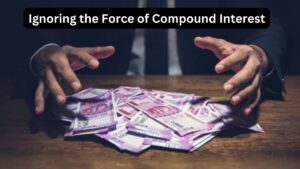
Top 10 Most Common Financial Mistakes
Exploring individual accounting records can be testing, and, surprisingly, the most monetarily clever people are inclined to commit errors.
Understanding these normal stumbles can keep you from falling into monetary snares that could affect your future security.
Here are the best 10 most normal monetary missteps, each made sense of with a genuine model.
1. Living Past Your Means

It’s enticing to stay aware of a way of life you can’t bear, frequently prompting obligation.
Many individuals overspend on extravagance things or encounters, disregarding their drawn out monetary wellbeing.
Example:
Ravi procures ₹60,000 per month yet burns through ₹70,000 because of extravagance buys, like the most recent contraptions.
In no time, his Visa obligation becomes unmanageable, affecting his FICO rating and constraining him to cut back.
2. Not Having a Crisis Fund

A backup stash fills in as a security net for unforeseen costs, like health related crises, employment deficit, or vehicle fixes.
Without this asset, individuals wind up utilizing exorbitant interest credit.
Example:
Priya lost her employment and didn’t have investment funds to cover her costs.
She needed to depend on an individual credit with an exorbitant loan cost, which further stressed her funds during joblessness.
3. Ignoring the Force of Compound Interest

Individuals frequently defer money management, thinking they’ll begin “later.”
Be that as it may, holding up implies passing up the advantages of accumulating funds, where profit develop on reinvested returns after some time.
Example:
Aditi, at 30, deferred her retirement investment funds until 40. Her companion Raj began at 25.
However Raj saved a similar sum, he wound up with almost two times as much at 60, because of self multiplying dividends after some time.
4. Neglecting to Budget

Without a spending plan, it’s difficult to comprehend where your cash goes, prompting superfluous uses and monetary strain.
A spending plan dispenses assets toward requirements, reserve funds, and needs successfully.
Example:
Ramesh procures ₹50,000 month to month however never monitors costs.
He frequently ponders where his cash proceeded to battle to save.
Subsequent to beginning a financial plan, he understood he was burning through ₹10,000 month to month on take-out, which he could chop down to save.
5. Taking on Superfluous Debt

Charge cards and credits are not difficult to get to, however obligation rapidly turns into a weight.
Individuals frequently get to purchase things they don’t genuinely require, later battling with reimbursement.
Example:
Sanjay took a credit to purchase a top of the line cruiser spontaneously.
After a year, he lamented the buy, as the month to month EMIs limited his capacity to put resources into different needs like travel or putting something aside for a house.
6. Failing to Guarantee Adequately

Protection is fundamental for assurance against critical monetary misfortunes because of mishaps, sicknesses, or unanticipated occasions.
Many skip protection, taking into account it an “extra” cost, which can be terrible.
Example:
Ankur stayed away from health care coverage to set aside cash.
At the point when he was hospitalized because of a mishap, his doctor’s visit expenses were over ₹3 lakhs, which he needed to pay from cash on hand, essentially exhausting his reserve funds.
7. Ignoring Retirement Savings

Deferring retirement commitments is a typical error, with many individuals expecting they can “look up some other time”.
Postponing retirement investment funds can prompt deficient assets when you quit working.
Example:
Suman, at 45, acknowledged she had no retirement investment funds.
To make up for lost time, she needed to save a lot higher piece of her pay than if she’d began before, decreasing her discretionary cashflow essentially.
8. Overlooking Expense Benefits
Neglecting to use charge allowances and exceptions is another normal oversight.
Many individuals ignore charge saving speculation choices, prompting a higher taxation rate.
Example:
Rohit disregarded charge saving choices and didn’t put resources into Segment 80C instruments like PPF or ELSS.
Subsequently, he paid ₹60,000 more in charges than his associate, who utilized the exceptions carefully.
9. Not Contributing As per Chance Tolerance
Numerous financial backers neglect to survey their gamble resilience prior to effective money management.
They either face inordinate gamble challenges the capability of significant yields or stay away from speculations, dreading misfortune.
Example:
Shalini, at 30, put every one of her reserve funds in unstable stocks expecting fast gains.
A market plunge caused her significant misfortunes.
Had she expanded with a blend of stocks and more secure choices, her misfortunes would have been less extreme.
10. Impulse Purchasing and Impromptu Expenses
Motivation purchasing is a typical propensity, where individuals buy things spontaneously disregarding their monetary circumstance.
These buys frequently add up and disturb investment funds plans.
Example:
Amit indiscreetly purchased a new cell phone during a deal, notwithstanding his current telephone functioning admirably.
This spontaneous ₹20,000 cost decreased his month to month investment funds, postponing his arrangement to purchase a PC for work.
Conclusion:
Perceiving these normal monetary errors and gaining from others’ encounters can assist you with building a safer monetary future.
By living inside your means, planning, effective money management, and anticipating crises, you can stay away from monetary entanglements and work toward accomplishing monetary solidness.
